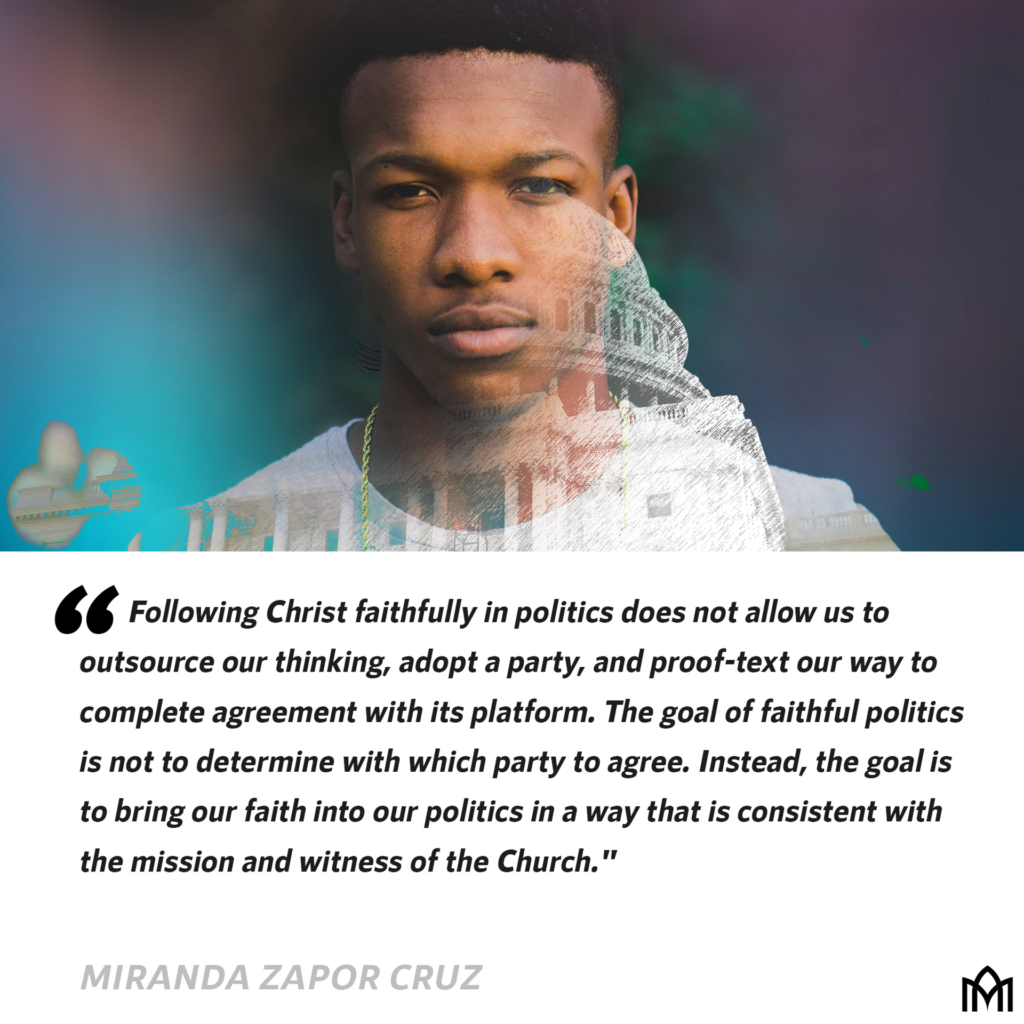Faithful Approaches to Politics
For Kingdom and Country (Faithful Politics, Part 2)
My student has asked to meet again. She’s reflected on our previous conversation, when I explained our dual-citizenship in heaven and on earth. She can see why it matters that the Kingdom of God is essentially different from the country. She knows that the United States will not become the Kingdom of God. But election day is coming. She wants to make the right decision, the faithful decision. She asks me again, “How am I to vote, as a Christian? How is my faith supposed to relate to my politics?” Once again, I will not offer a simple answer, a checklist, or a party platform. Instead, we’ll explore the tension between faith and politics more, this time considering some faithful options that are available to Christians as we navigate life in our country as citizens of the Kingdom of God.
A Faithful Party?
A real Christian can’t vote for…whom? The clear biblical choice is…which party? Maybe you answered those questions quickly in your mind, and struggle to understand how a Christian could possibly vote for the “other” party. Consider the possibility that someone is wondering the same about you. Christians of good faith can arrive at different party preferences, because no one political party fully aligns with the Kingdom of God. We know this because political parties and their platforms are designed to govern countries, which are not the Kingdom of God. Any political party will, therefore, be incompatible at some points with the mission and values of the Kingdom of God.
Many voter guides, political pundits, or Christian partisans declare one party as the only Christian choice. But following Christ faithfully in politics does not allow us to outsource our thinking, adopt a party, and proof-text our way to complete agreement with its platform. The goal of faithful politics is not to determine with which party to agree. Instead, the goal is to bring our faith into our politics in a way that is consistent with the mission and witness of the Church.
Let’s set partisanship aside to examine a few possibilities.
Christians of good faith can arrive at different party preferences, because no one political party fully aligns with the Kingdom of God. We know this as political parties and their platforms are designed to govern countries. (1/2) Share on X
Countries, no matter how much you love them, are not the Kingdom of God. Any political party will, therefore, be incompatible at some points with the mission and values of the Kingdom of God. (2/2) Share on X
Faithful Approaches to Politics
The various branches of Christianity can guide Christians today as we engage with politics. Consider a range of possibilities can provide us with a framework for making informed choices about specific parties, issues, and candidates.
A Prophetic Approach
The Anabaptist tradition offers us a prophetic approach that holds several realities in tension: the Kingdom of God is fundamentally incompatible with the world, and yet the citizens of the Kingdom are called to be in the world for the sake of Christian witness to the world. This approach calls on the Church to bear public witness to the Kingdom of God. As Stanley Hauerwas and Will Willimon explain in Resident Aliens, “this church knows that its most credible form of witness (and the most ‘effective’ thing it can do for the world) is the actual creation of a living, breathing, visible community of faith…The overriding political task of the church is to be the community of the cross.” The church as church stands in stark contrast to the political structures of the world. The church’s witness is prophetic when it engages civic life in nonpartisan and noncoercive ways. The prophetic approach of the Anabaptists reminds us that God’s Kingdom will not come through political revolution. Our citizenship is in heaven, and we await a savior from there (Philippians 3:20).
A Separationist Approach
The Baptist tradition offers a separationist approach to the relationship between church and government. The Baptists of seventeenth-century England rejected the notion that anyone other than the free individual could have authority over one’s conscience. Baptists brought this principle with them to America, where it made its way into the First Amendment to the United States Constitution. Some Christians were fearful that Christianity and morality would stagnate or decline without government establishment. Instead, Christianity revived, spread, and became deeply embedded in the fabric of American society. The Baptist model of church-state separation emphasizes that the government should not interfere with religious beliefs and practices, but that does not mean Christians as Christians cannot fully participate in political discourse and policy making. We can bring our best faith-based case into the public square, but we should be prepared for the possibility that a faith-based argument might not convince people who do not share our beliefs. We can also think carefully about whether and how certain faith convictions ought to directly influence legislation. Church-state separation does not require us to privatize Christianity, but rather to bring it into public in ways that demonstrate love of neighbor and present a winsome witness for Christ.
A Social Gospel Approach
Another approach to political engagement comes from the evangelical social gospel movement of the nineteenth-century United States. The social gospel is the belief that Christianity has social implications and ought to influence morality, policy, and economic systems. The social gospel teaches that Christians can and should make the Kingdom of God a reality “on earth as it is in heaven” through personal righteousness and social reform. In the nineteenth and early twentieth centuries, these reforms included issues like alcohol abuse, labor laws, women’s rights, and economic disparities. Today, Christians associated with the social gospel often start with belief in the sanctity of all life, with implications for everything from abortion to border policy to affordable health care access to economic welfare programs, among many other issues. The branches of Christianity most aligned with the social gospel in the United States include include many mainline Protestant denomination and African American churches, as well as the so-called “evangelical left.” The social gospel approach reminds Christians that we can change society for the better, sometimes through political means, although we cannot transform it into the Kingdom of God.
A Calvinist Approach
Another approach comes to us from the Calvinist theological tradition. Calvinist theologian and Dutch statesman Abraham Kuyper articulated an approach called principled pluralism or sphere sovereignty. For Kuyper, there are multiple (i.e. plural) spheres of society such as government, church, business, education, etc. Each sphere has its proper role in civil society, and each sphere of society ought to be independent from the state and from each other. One of Kuyper’s primary motivations was to prevent the government from overstepping its proper role and becoming authoritarian. Kuyper did not intend to prevent Christians from influencing other spheres of society, though. Kuyper famously asserted, “There is not a square inch in the whole domain of our human existence over which Christ, who is Sovereign over all, does not cry: ‘Mine!’” For Kuyper, Christians influence society as we bring our convictions and values into our roles in business, education, the arts, government, etc. In politics, Christians who serve in any capacity must do so with integrity and in a way that positively represents Christ. When it comes to legislating, Christians in politics need to articulate their convictions in a compelling and winsome way. The goal is not to demand the right of Christians to govern – indeed Christ reigns, whether Christians are in charge or not. The goal is to promote human flourishing, which happens best when government and other spheres carry out their unique roles with excellence to bring greater justice and abundance into the world.
Following Christ faithfully in politics does not allow us to outsource our thinking, adopt a party, and proof-text our way to complete agreement with its platform. The goal of faithful politics is not political party alignment. (1/2) Share on X
Instead, the goal of faithful politics is to bring our faith into our politics in a way that is consistent with the mission and witness of the Church. (2/2) Share on X
Stay Salty
Jesus tells us, “You are the salt of the earth,” (Matthew 5:30). Whatever our approach to politics, Christians should be salt. That is, we should add missing flavor and act as a preservative. Christians should season political conversation, advocacy, policy proposals, and even candidacy in such a way that people can recognize our contribution as beneficial and worth seeking out. Saltiness requires us to be clear about the points at which our Christian convictions compel us to deviate from the party line. A salty tone and communication style should leave people with a good taste and a desire for more – even when we disagree. Saltiness requires critical thinking. We must examine party platforms, listen between the partisan spin, read the policy proposals, and hear out the best possible case for multiple sides of issues. Critical thinking requires sustained effort, including occasional review and revision of our political positions.
If salt loses its saltiness, “it is no longer good for anything except to be thrown out and trampled underfoot” (Matthew 5:13). When we lose our saltiness, we add nothing of value to the public square. Christians who are bland align with a party on every point, mirror its rhetoric, turn opponents into enemies, and ultimately equate party loyalty with godliness. Blandness sometimes goes beyond unfaithfulness to outright hostility and even violence. Recent research on college students finds over ten percent of both Democrats and Republicans “have thoughts of a desire to get rid of or destroy” members of the opposing party, “to take action in order to take revenge” or “imagine a violent action against” them. The majority of people who imagine violence do not take action, but some do. Whatever our partisan leanings, we are at risk of becoming bland and we need to intentionally pursue the discipleship and critical thinking that enable us to become and remain salty.
How, then, Shall We Vote?
The range of faithful Christian approaches helps us recognize that Christians can come to different political conclusions. As we approach the election, we can consider what role Christians have in influencing society through policy. Is it prophetic, separationist, social gospel, pluralist, or another option? Is it some combination of these depending on the specific issue and context? Political decisions don’t need to become easier; they need to become more faithful. In part three of this series, we’ll gather at the table once more to consider how Christ-followers should respond after the election.
///
Christians can come to different political conclusions. Political decisions don’t need to become easier; they need to become more faithful. Share on X
*Editorial Note: Part 1 of Miranda’s Faithful Politics series, entitled “My Country Isn’t the Kingdom,” can be read here. Part 3, entitled “Faithful Responses to Election Results,” can be found here. If you’d like to read an excerpt of Miranda’s new book, Faithful Politics, the first chapter is available for download here: Citizens of the Kingdom (Ch. 1, Faithful Politics) | Miranda Zapor Cruz. ~CK





